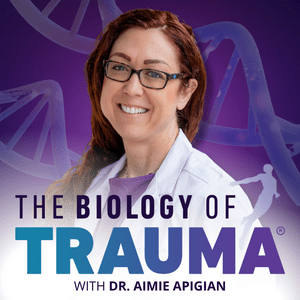Neuroception Explained: How Your Nervous System Decides What's Safe and Why It Matters for Healing
"Neuroception is what determines our response to everything in any moment of our life. It is not based on reality. It is based on one's perception.” – Dr. Aimie Have you ever wondered why it's so hard to stick to healthy habits, even when you know they'll help you feel better? Or why those you help can’t seem resistant to their treatment plan? The truth is, it's not about willpower or motivation. Deep inside the body, there's an invisible security system constantly asking one question: "Am I safe right now, or am I in danger?" This system is called neuroception, and it's been quietly running your life without you knowing it. When this internal alarm system thinks you're in danger, even when you're perfectly safe, it can make your body reject the very things that would help you heal. Supplements feel overwhelming. Diet changes seem impossible. Exercise feels like too much. Your body isn't being difficult. In fact, it's actually trying to protect you! In this episode, Dr. Aimie breaks down neuroception and shows you exactly how to work with your nervous system instead of against it. You'll discover why some days you feel motivated and capable, while other days everything feels overwhelming, and most importantly, what you can do about it. You'll learn: The simple equation your body uses to decide if you're safe or in danger Why your body sometimes rejects healthy changes (Hint: it's not your fault!) The three different states your nervous system operates in How to tell which state you're in right now Simple body-based techniques to shift into a state of safety Why addressing oxidative stress is crucial for lasting change How to create an environment where healing actually feels possible And more! Whether you're someone struggling to maintain healthy habits or a practitioner working with people who seem "resistant" to treatment, this episode will completely change how you understand behavior, motivation, and the healing process. Helpful Links Related To This Episode: Biology of Trauma book - how the body experiences and holds fear, pain and overwhelm, and how to heal. Pre-order now and, at the time of this recording, you’ll get over $400 in bonuses included! Those bonuses are only for the pre-order window which goes until Sept 22, 2025. When you’ve already pre-ordered it on Amazon head over here to receive your bonuses. The 21 Day Journey - If you're ready to create a felt sense of safety in your body and experience the benefits of 26% decrease in daily physical pain, 28% decrease in sleep issues and digestive issues, 30% decrease in anxiety, depression, or want to learn how to do this for those you help - join me for your 21-Day Journey, a structured sequence of gentle, somatic-based self-practices walking you through The Essential Sequence to safely open up stored trauma in the body. Related Podcast Episodes: Episode35: When trauma Has Made It Unsafe To Feel Safe, What Do We Do? with Dr. Stephen Porges Episode 73: The Impact of Early Attachment Shocks: How Unexpected Stressors Can Cause Developmental Trauma & What To Do Disclaimer: By listening to this podcast, you agree not to use this podcast as medical, psychological, or mental health advice to treat any medical or psychological condition in yourself or others. This podcast is for informational and educational purposes only and does not constitute professional advice, diagnosis, or treatment. Always consult your own physician, therapist, psychiatrist, or other qualified health provider regarding any physical or mental health issues you may be experiencing. This entire disclaimer also applies to any guests or contributors to the podcast. Under no circumstances shall Trauma Healing Accelerated, any guests or contributors to The Biology of Trauma® podcast, or any employees, associates, or affiliates of Trauma Healing Accelerated be responsible for damages arising from the use or misuse of the content provided in this podcast. Timestamps: [01:51] What is this invisible security system in your body? [06:09] The simple math your body does every second: Can I handle what's happening to me? [12:10] The three modes your nervous system switches between (and how to recognize them) [15:00] Why anxiety and depression might actually be your nervous system trying to protect you [20:00] How past experiences get "stuck" in your muscles and keep you feeling unsafe [25:00] Body language clues that reveal which mode someone is in [27:01] Why you need to heal your cells, not just your mind [29:51] The hidden cellular damage that keeps you stuck in "danger mode" [33:46] The three-level approach that actually works: Mind, body movement, and cellular health [36:42] Why "self-sabotage" is actually your body trying to keep you safe
